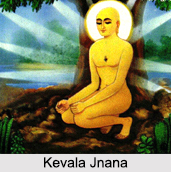 Kevala Jnana in Jainism is roughly translated as absolute knowledge or supreme knowledge. Kevala Jnana or omniscience refers to the ability of having knowledge of past, present and future of everything at the same time. According to Jainism, omniscience is the highest type of perception which falls in the category of extra-sensory perception. It is the highest type of knowledge and the perfection of the cognising faculty of the soul.
Kevala Jnana in Jainism is roughly translated as absolute knowledge or supreme knowledge. Kevala Jnana or omniscience refers to the ability of having knowledge of past, present and future of everything at the same time. According to Jainism, omniscience is the highest type of perception which falls in the category of extra-sensory perception. It is the highest type of knowledge and the perfection of the cognising faculty of the soul.
Kevala Jnana is omniscience or a stage when human finally cutting across all the shackles of Maya attains Moksha. At this stage the soul after learning of the absolute, gains knowledge of everything and merges into the supreme. The person possessing this faculty perceives all the substances with all their modes. Nothing is unknown to him; his knowledge is pure and perfect due to the total destruction of all the possible obstructions.
Kevala Jnana is possible only when all the Jnana obscuring karmas have been totally annihilated. It is independent of senses, can be only felt and cannot be described. This supreme and unlimited knowledge is possessed only by purified souls free from bondage like Arihants and Siddhas.




















